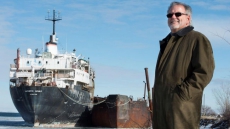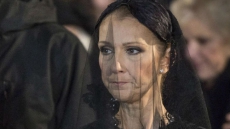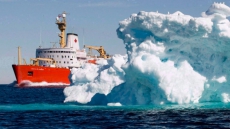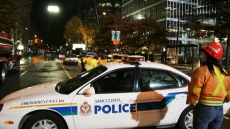OTTAWA — Canadian military trainers will likely face "engagements" with enemy Islamic militants in Iraq, but that doesn't mean they're in a combat mission, the chief of the defence staff said Monday as the Liberal government finally deployed its long-awaited alternative to bombing sorties in the Middle East.
In offering his view of Canada's expanded training mission, Gen. Jonathan Vance went some to lengths to avoid contradicting his boss, Prime Minister Justin Trudeau, who has insisted trainers would not be involved in combat.
"The prime minister has clearly described it as non-combat" and there's a "penchant ... for people to try and parse the words," Vance said Monday during a technical briefing that followed Trudeau's announcement.
"In my view, it's a non-combat mission in that we are not the principal combatants here."
Canada's fighter jets will end their bombing mission in Iraq and Syria within two weeks, to be replaced by what Trudeau called an expanded mission focused on training local security forces and helping to rebuild the shattered region.
Canadian bombs will stop falling by Feb. 22, while the complement of military personnel in the region climbs to 830 — up from the current 650 — to provide planning, targeting and intelligence expertise.
The size of Canada's "train, advise and assist" mission will also triple, including additional medical personnel and equipment including small arms, ammunition and optics to assist in training Iraqi security forces, mostly in the Kurdish north.
"I want Canadians to know that we will be involved in engagements as we defend ourselves or those partners who we are working with," said Vance.

That's because the "assist function helps them plan, helps them determine how best to accomplish the missions" and by doing that they "may very well need support in defending them, and in so doing, defending ourselves."
Earlier, Trudeau was asked whether Canadian trainers would be embedded with Iraqi forces and be authorized to fight.
"This is an advise and assist and equip mission that our trainers will be engaged in," Trudeau replied. "As I said many times throughout the campaign in my commitment to Canadians, this is a non-combat mission."
Canada learned the hard way during 10 years in Afghanistan that airstrike operations, while useful in the short term for "military and territorial gains," do not on their own result in long-term stability, said Trudeau.
They can also be politically expedient, he suggested — a subtle jab at his Conservative predecessors who sent the jets into Iraq and Syria in the first place.
"We are for what will be effective," Trudeau said, "not for what will make us feel good to say at any given moment."
Canada gained a lot of valuable experience training local Afghan police and military forces during a decade spent fighting in that country, he added — experience that the Canadian Armed Forces should be bringing to bear in Iraq and Syria.
The new Liberal mission will also include a team of strategic advisers to help Iraq's defence and interior ministries. Canada's CC-150 Polaris refueller and two CP-140 Aurora surveillance planes will remain part of the operation.
Trudeau made the long-awaited announcement alongside Foreign Affairs Minister Stephane Dion, Defence Minister Harjit Sajjan and International Development Minister Marie-Claude Bibeau.

The time frame of Operation Impact — Canada's contribution to the U.S.-led coalition mission against the group known as the Islamic State of Iraq and the Levant — is also being extended until the end of March 2017.
Trudeau said Monday the government would be spending more than $1.6 billion over the next three years on the mission as a whole, including on security, stabilization, humanitarian and development assistance in the region. That includes $840 million to provide water, shelter health care, hygiene and sanitation, and $270 million to build capacity in those countries helping refugees from the region.
Canada has already committed $650 million in humanitarian aid for people affected by the Syrian civil war and $233 million for longer-term development. It wasn't immediately clear whether those figures were part of the larger $1.6-billion total.
Trudeau's announcement comes before Sajjan travels to Brussels for a two-day meeting with his NATO counterparts that begins Wednesday.
The U.S. has publicly said it respects Canada's decision to pull its fighter jets out of the air campaign. But the Americans chose not to invite Sajjan to two impromptu coalition meetings in Paris, which the newly minted defence minister shrugged off.
On Monday, U.S. State Department spokesman John Kirby said Canada's "additional significant contributions" were a welcome addition to the anti-ISIL coalition.
"Canada remains an essential partner in the counter-ISIL mission," said Kirby. "The United States, Canada, and the rest of our partners remain unwavering in our commitment to destroy ISIL."

The opposition Conservatives renewed their criticism of the Liberal plan to withdraw the fighter jets.
"This Prime Minister is taking a shameful step backward," interim Conservative leader Rona Ambrose said in a statement.
A CHRONOLOGICAL LOOK AT CANADA'S INVOLVEMENT IN THE FIGHT AGAINST ISIL
OTTAWA — Here is a timeline of Canada's involvement in the fight against the militants of the Islamic State of Iraq and the Levant, also known as ISIL or ISIS:
Aug. 7, 2014 —United States President Barack Obama authorizes targeted military intervention in Iraq.
Aug. 28, 2014 — A Canadian Forces C-17 cargo plane makes the first delivery of military supplies to forces in Iraq, bringing in provisions donated by Albania.
Aug. 28-Sept. 26, 2014 — Canadian aircraft make 25 flights and deliver 725,000 kilograms of donated military supplies to Iraq.
Sept. 5, 2014 — Prime Minister Stephen Harper announces the deployment of several dozen members of the Canadian Forces to Iraq to join the U.S. in advising security forces.
Sept. 19, 2014 — The U.S. government asks Canada for additional military support against ISIL.
Oct. 3, 2014 — Harper speaks in the House of Commons about Canada's future contributions to the fight against ISIL.

Oct. 7, 2014 — Following a debate and a vote in the House of Commons, the Harper government announces that Canadian warplanes will join coalition forces attacking ISIL's capacity to fight in Iraq.
Oct. 28, 2014 — Canadian aircraft arrive in the region: six CF-18 Hornet fighter-bombers, a CC-150 Polaris aerial tanker and two CP-140 Auroras for surveillance and reconnaissance missions.
Nov. 2, 2014 — CF-18 Hornets conduct their first combat strikes on ISIL targets. Over the next 15 months they will fly more than 1,300 sorties.
March 6, 2015 — Special forces soldier Sgt. Andrew Doiron, part of the Canadian training mission, is killed in a friendly-fire incident involving Kurdish troops.
March 24, 2015 — Harper tells the Commons the military mission will be extended and expanded, allowing airstrikes in Syria and the deployment of up to 30 officers to coalition headquarters.
Feb. 8, 2016 — In keeping with a controversial campaign promise, Prime Minister Justin Trudeau's Liberal government announces major changes to Canada's commitment to the fight, with a renewed focus on training and humanitarian aid. CF-18 warplanes are to be withdrawn by Feb. 22, although refueller and reconnaissance aircraft to remain deployed, along with crew.




